Another tense election season has come and gone in the United States, marked by threats of violence and far-right conspiracy theories. In the lead-up to the U.S. 2022 midterm elections, researchers at the Giffords Law Center expressed concern about armed extremists, and journalists reported on voter suppression laws and vigilantes conducting ballot box monitoring. The Global Project Against Hate and Extremism highlighted the battleground states where the threat was highest, but thanks in part to a ruling from a federal judge in Arizona, national groups such as Clean Elections USA were deterred from mobilising larger efforts. When election day finally came, votes were tallied largely without incident.
In the wake of the results of the midterms, the GOP and the far-right have had to contend with their losses and formulate a new plan ahead of the 2024 election cycle. This Insight traces the splintering of far-right Telegram users into different factions as a result of the midterms. far-right users can be categorised as supporting three candidates: Trump, DeSantis, or Ye (f.k.a Kanye West).
There is also a fourth group of Telegram users who feel disillusioned by electoral politics and are entertaining ideas of violence in their posts. These users express a dark and often nihilistic outlook on politics, as well as a feeling that mainstream politics have failed them and will continue to fail them. They arrive at these sentiments as a result of their conspiratorial outlook on the world. In this Insight, I will refer to this group of Telegram users as “blackpilled,” a term often used among various groups within the online far-right ecosystem. To borrow language from the Anti-Defamation League, to be blackpilled is to “believe that attempting to change the status quo [is] futile and the only possible outcomes [are] death and violence.” It is impossible to know if statements made by blackpillers are genuine or performative, but as illustrated throughout, there is a concerning trend of users expressing these sentiments on Telegram.
In this Insight, I observe the behaviour of four groups of Telegram users: DeSantis supporters, Trump supporters, Ye supporters and blackpilled members of the far-right. I then assess the growing threat that is posed by disillusioned blackpilled Telegram users. Following that, I propose a conceptual framework to help understand how far-right groups are able to introduce their ideas to mainstream groups. Finally, I reflect on what this threat environment means for the 2024 general elections.
DeSantis and his Supporters
Ron DeSantis was elected Governor of Florida in 2018, in large part thanks to an endorsement by then-President Donald Trump. After Trump failed to get re-elected in 2020, DeSantis rose to the national spotlight as the next potential leader of the Republican Party. While DeSantis has not yet announced an official campaign for 2024, a Political Action Committee (PAC) has started to fundraise for a potential campaign. Several Republican ‘megadonors’ have voiced support for DeSantis over Trump in 2024. According to Politico, people close to DeSantis have said that if he does run, the announcement will not be until March 2023. This timing would allow the Florida legislature time to pass laws allowing the Governor to run for President without having to resign his current office.
Among members of the far-right online, DeSantis is considered a moderate and consequently gets mixed support from Telegram users. The far-right takes issue with DeSantis’ promotion of vaccinations. Telegram users have made accusations of DeSantis having connections to the ‘Deep State’. The Deep State is a concept commonly used as a scapegoat by conspiracy theorists to denote any person who may be considered a career politician with nefarious goals, someone who has long-standing ties to political operatives, or even anyone who is critical of Donald Trump. When users posted a supportive article about DeSantis on a far-right Telegram channel, other users responded with negative feedback connected with DeSantis pro-vaccination stance and accusations of connections to the Deep State, falsely citing that one of his aides, Christine Pushaw, is connected to George Soros.

Similar criticisms of DeSantis by Trump supporters or other members of the far-right were found across Telegram channels, including influencer Ali Alexander, who is most known as the founder of the Stop The Steal movement. On Ali’s channel, he criticised DeSantis for not commenting on the DOJ investigation of Trump.
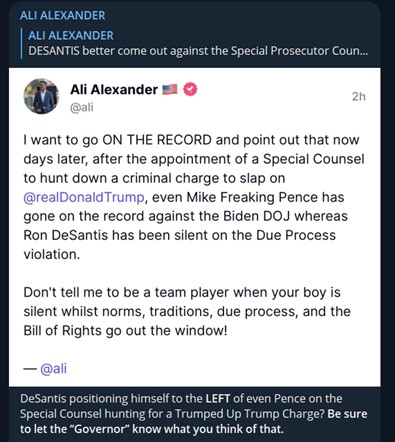
Criticisms of DeSantis, oftentimes based on misinformation or conspiracy theories, were fairly common across all channels. Some Telegram users even called DeSantis a “traitor” for considering a presidential run against Trump. DeSantis received the most mentions on Telegram around election day, before rapidly decreasing to pre-election day levels after he beat Charlie Crist in the Florida Gubernatorial race.
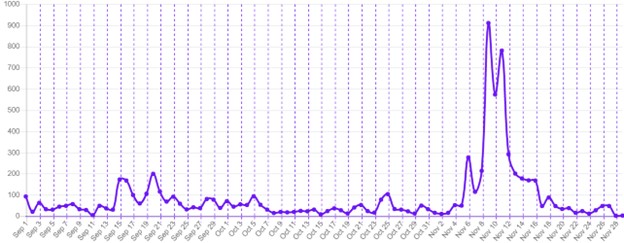
Figure 1: DeSantis Telegram mentions, Sept-Nov 2022. Source: SMAT-app.com
Trump and the MAGA Movement
Donald Trump served as President of the United States from 2017-2021. Trump was impeached twice while in office; the first impeachment in 2019 was for allegedly withholding military aid from Ukraine unless they launched an investigation into conspiracy theories related to his then political opponent Joe Biden. Trump’s second impeachment in 2021 was related to his involvement in the deadly January 6th insurrection. Both impeachments failed to convict the former president. Trump announced his campaign for the 2024 general election on November 15 2022, and has also discouraged DeSantis from running.
Among the many MAGA channels on Telegram, conspiracy theories run deep, especially surrounding the outcomes of the 2020 and 2022 elections. Stories promoted on channels such as ‘AZREVOTE’ and ‘MAKE AMERICA GREAT AGAIN!’ allege that voter fraud is widespread and supported by the Democratic Party. Trump supporters also make frequent statements about their disdain for perceived RINO’s (Republicans In Name Only). DeSantis and Mike Pence are both considered by members of these groups to have betrayed Trump. In one popular MAGA channel, DeSantis and Arizona gubernatorial candidate Kari Lake are accused of dividing Trump’s supporter base. Additionally, popular far-right website ‘The Gateway Pundit’ published an article that accused Mike Pence of being a “turncoat” for calling on Trump to apologise for having dinner with Ye and Nick Fuentes. This post was shared by users on multiple other Telegram channels that supported Trump. The accusation reflects a belief that Trump has nothing to apologise for, despite Fuentes being a known white nationalist and Ye having made numerous antisemitic statements.
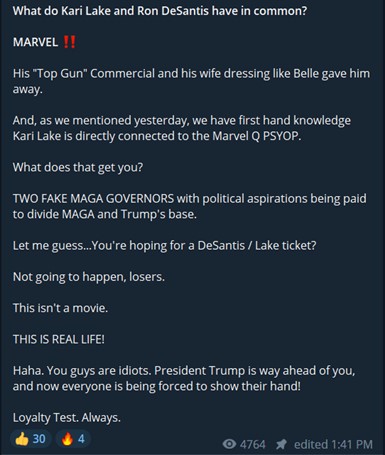
A MAGA channel proposes a conspiracy theory about Lake and DeSantis dividing Trump’s base
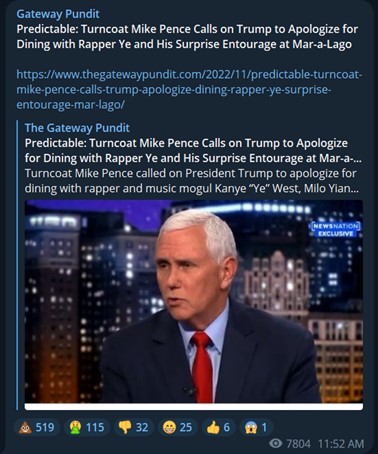
A popular far-right website accuses Pence of betraying Trump
Mentions of Trump on Telegram show a similar pattern to DeSantis. The activity from Telegram users around election day was likely driven by his endorsements and the ongoing accusations of voter fraud in Arizona. It is worth noting that Trump was receiving thousands of mentions a day around the election and reached a low of zero on November 30th.
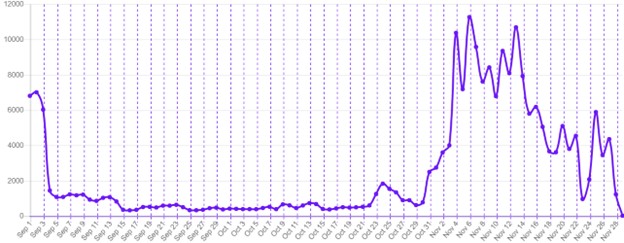
Figure 2: Trump Telegram mentions, Sept-Nov 2022. Source: SMAT-app.com
Ye, Fuentes, and the Groyper Army
Rapper and business mogul Ye, formerly known as Kanye West, announced his 2024 presidential campaign on November 20th, 2022 while answering questions from paparazzi in Los Angeles, California. November as well. Ye has also recently made numerous antisemitic remarks, going so far as to praise Hitler in a recent episode of the conspiracy theory show InfoWars hosted by Alex Jones.
During his announcement, Ye revealed that alt-right media personality Milo Yiannopoulos, who had previously worked at Breitbart until he resigned in 2017 after publicly defending paedophilia, would be working on his campaign. Days later, on November 22, Ye was spotted with Nick Fuentes, a far-right media personality whose fans include neo-Nazis and incels, as the two of them went to meet with Donald Trump.
Ye was already receiving support from neo-Nazis in October when he began making repeatedly antisemitic statements in public. Groups such as the Goyim Defense League amplified his statements in the hopes of rallying Black supporters to their cause against “a universal enemy.” When Ye brought Fuentes onto the campaign, he opened the door for additional support from members of the far-right, including Fuentes’ fans who call themselves Groypers. As the ADL has reported, “several prominent Groypers changed their social media handles to signal the shift. Tim Gionet (aka Baked Alaska) changed his handle on Telegram…Tyler Russell and Steve Franssen have done the same.” These influencers added “YE24” to their handles in order to mark their endorsement. The ADL went on to state that Ye has also received support from some of the more extreme Proud Boys chapters, as well as from the founder of neo-Nazi website the Daily Stormer, Andrew Anglin.
The growth in support that Ye has experienced is also reflected in his mentions on Telegram, where we see large spikes anytime he makes a media appearance.
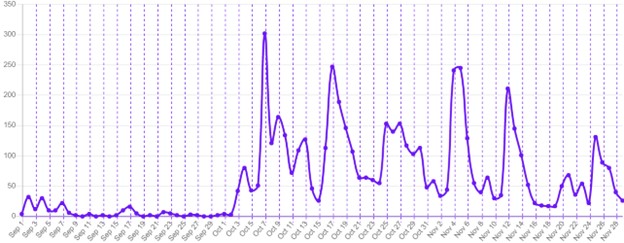
Figure 3: Ye (f.k.a. Kanye West) Telegram mentions, Sept-Nov 2022. Source: SMAT-app.com
Meanwhile, Fuentes appears to have successfully parlayed his involvement with Ye into an opportunity to get more recognition. Fuentes has now been written about extensively by the mainstream media and is also being discussed more frequently on Telegram, as demonstrated below.
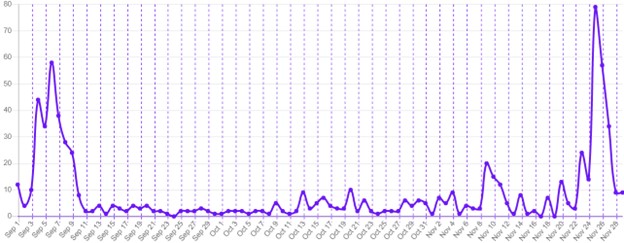
Figure 5 Fuentes Telegram mentions, Sept-Nov 2022. Source: SMAT-app.com
Taking the Blackpill
Finally, a growing number of Telegram users in conservative and far-right channels and groups are indicating a lack of faith in the electoral system and an openness to antisemitic conspiracy theories. In Telegram channels and groups specific to states like Michigan, Pennsylvania, and Arizona, users are expressing a belief that voting is not enough. One user, in response to a Pennsylvania county not doing a hand count stated:
“I swear, sitting around and waiting is like falling from a mountain without a parachute in slow motion. The people have a right and duty to change this shit. Maybe it’s time the voters get together and vote to arrest these traitor scumbags.”
In a separate Telegram group that focuses on conservative causes in Pennsylvania, there are repeated unchallenged claims that Jews run the media, stole the election, and are responsible for COVID-19.
After the midterm elections, Arizona became a hotbed for conspiracy theories and discussions of needing to “do more” – with the implication of “more” often meaning violence. After Kari Lake lost her gubernatorial campaign, a user in one of these groups shared a post that openly fantasised about the execution of Lakes’ political opponent:
“I will gladly fly out to AZ to witness Hobbs being executed for Treason. Enough of this madness. Life sentence is acceptable if she sings and the puppet masters pulling her strings are executed instead (upon conviction of course).”
Another user stated:
“lets face it – until our “leaders” are forced to feel some “political pain,” why would they change? They are getting everything they want currently with ZERO consequences!”
“FOLKS – if you haven’t figured out its up to us now…I can’t help you. Go quietly into the night & may your chains not burden you…”
Similar to the Pennsylvania groups, there are regular antisemitic conspiracy theories shared in these spaces:
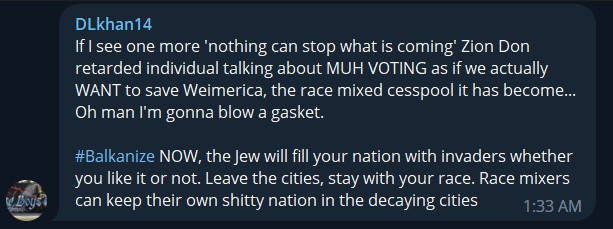
Constant exposure to antisemitic content and a lack of faith in democratic institutions place users of far-right channels at an increased risk of supporting violent extremist ideology. Channels that promote extremist content exist alongside more mainstream channels. For example, Ryan Sanchez, who runs the Telegram Channel ‘Culture War Criminal,’ expressed sympathy for Riley June Williams after she was found guilty of six felonies in connection to January 6th. According to a report by Robert Evans at Bellingcat, Williams was connected to multiple online Nazi communities and was a fan of Nick Fuentes. More extreme far-right groups, such as ‘The Western Chauvinist (censored)’ channel have made sweeping antisemitic and racist criticisms of Fuentes and Ye, and regularly encourage white people to seize power and use violence to remove minorities from the United States.
To understand what type of impact these political actors may have had on the far-right who are increasingly blackpilled, I also looked at mentions of Jewish people from the same time period. Figure 6 charts the use of the term ‘Jews’ on Telegram between September and November 2022.
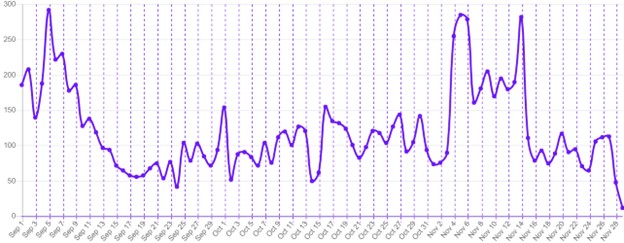
Figure 6 Mentions of the word ‘Jews’ on Telegram, Sept-Nov. Source: SMAT-app.com
There are two takeaways from this graph. The first is there is a sustained spike in mentions around the midterm elections, likely due to discussions of antisemitic conspiracy theories. The second is the dip in mentions immediately after, which coincides with Ye and Fuentes both receiving more mentions. It is possible that there was less of a need for users to post their own thoughts because all they needed to do was repost videos of Ye or Fuentes.
Conclusions
The four groups of Telegram users examined in this Insight can best be understood on a spectrum that ranges from more moderate or mainstream conservatism (DeSantis) to the very far-right (blackpillers), and might look something like this:

In the channels observed, the supporters of each of these political actors engaged in a push-pull dynamic with the groups immediately adjacent to them on the above spectrum. Those who were blackpilled considered Fuentes to be a race traitor for working with Ye. Fuentes, Ye, and their supporters have been critical of Trump for issues ranging from his support for Israel to his lacklustre campaign announcement in November. Trump and his supporters are critical of DeSantis for ‘betraying’ Trump by considering a presidential run in 2024. This dynamic can be illustrated in a similar way:

Through this push-pull dynamic, ideas from the very far-right can be laundered through Ye and Fuentes. Trump is engaging with these views through direct meetings or through the tweets that Ye has been putting out and the resulting media coverage. In turn, these same ideas can be reworded or reframed as policy by Trump in mainstream political arenas such as interviews and debates ahead of the 2024 election. The mainstreaming of far-right ideas may result in more moderate candidates like DeSantis having to respond and grapple with increasingly extreme ideas and positions.
In sum, there are two main issues of concern that arise out of the post-midterm election news cycle. First, disenchanted Republicans who believe that the 2020 general and 2022 midterm elections were stolen are increasingly open to far-right conspiracy theories and calls to action. This movement away from electoralism signals an increased threat of physical safety to both politicians and election workers ahead of the coming 2024 general elections. Second, the Ye/Fuentes ticket may be used as a means of amplifying and legitimising antisemitic and hateful political stances to mainstream Republicans. The extremist elements within these groups are not subtle in their beliefs or their goals, and the organising and discourse that they engage in on Telegram reflect that. Allowing space for hate within a mainstream political party poses a threat to groups being targeted by that hate speech, as well as democracy itself.
Pete Kurtz-Glovas is a second year Masters student in the Penn State School of Public Policy with a focus in Extremism, Conflict, and Democracy. He is currently a researcher with the Global Project Against Hate and Extremism, a fellow with the Scholars Strategy Network, and a member of the Digital Sherlocks 2022 cohort through the Atlantic Councils Digital Forensics Research Lab. His fields of interest include understanding how hateful ideologies become mainstream talking points, exploring connections between far-right groups and mainstream politicians, and finding pragmatic policy solutions to stop the growth of hate groups.
